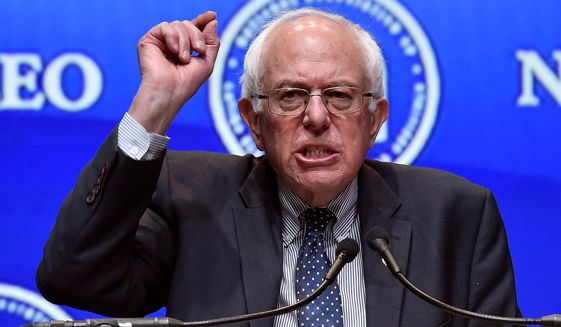Posted on November
10, 2015
Smell the Bern
Sanders’ odious deodorant remark
by
Daniel
Clark
In a May interview with the New York Times, Democrat presidential candidate Bernie Sanders
said, “You don’t necessarily need a choice of 23 underarm spray deodorants or
of 18 different pairs of sneakers when children are hungry in this
country.” To a rational person, this is
a non sequitur. Taking a product off the
market would do nothing to feed the hungry.
If Sanders is so concerned about hungry children, he should just tell
Michelle Obama to give them their food back.
This critique of his only rings true if you share his
belief that we have a “rigged economy” in which most new wealth “goes to the
top one percent.” In truth, the “one
percenters” earn about 15 percent of the income in the U.S., while paying 24
percent of all federal taxes. Yet even
if Sanders’ figures were anywhere near accurate, the question would be where
the wealth “goes” from. He does not consider
that the money used to market a product has been earned by the company, or has
been successfully raised from investors.
No, it must have been “distributed” by some evil entity that rightly
should have distributed that same money to the poor.
 Don’t
waste your time explaining to him that the production, distribution and sales
of a new product all employ people. No,
the deodorant makers simply consume the money that “goes to” them, without
anyone else ever seeing a dime.
Don’t
waste your time explaining to him that the production, distribution and sales
of a new product all employ people. No,
the deodorant makers simply consume the money that “goes to” them, without
anyone else ever seeing a dime.
This is where Republicans go wrong in praising Sanders
for his alleged honesty. Finally, they
say, we have a Democrat candidate who admits to being a socialist! However much we may disagree with him, at
least he means what he says.
No, he doesn’t.
Socialists are never honest, because they know their
argument can’t win if it is presented forthrightly. Just listen to the way that Sanders and other
leftists rail against capitalism.
Conservatives have no compunction about using the word “capitalism”
because we don’t hear any negative connotations in it, but Karl Marx invented
it as a pejorative term for the free market.
Had he called it by its correct name, he’d have been trying to persuade
people to reject the free market in favor of authoritarian control. Instead, he presented “capitalism” as if it
were just another top-down manmade system being imposed on the people by some
external power.
That’s just how Bernie Sanders talks about it
also. He would have us believe that capitalism
and socialism are competing models of centrally controlled economies, except
that the capitalist central planners are corrupt and mean, whereas the
socialists are benevolent, if pungent.
 Bernie’s
deodorant example presumes the existence of a gigantic reservoir of wealth that
has no rightful owner, and a central authority empowered to decide how much
“goes to” whom. It can’t be that
successful business owners earn their money, and reinvest it to produce a wider
array of products to the benefit of the consumer. No, their wealth was distributed to them by
some sinister capitalist central planner, who might just as easily have
distributed it to starving children, except that he wants them to die!
Bernie’s
deodorant example presumes the existence of a gigantic reservoir of wealth that
has no rightful owner, and a central authority empowered to decide how much
“goes to” whom. It can’t be that
successful business owners earn their money, and reinvest it to produce a wider
array of products to the benefit of the consumer. No, their wealth was distributed to them by
some sinister capitalist central planner, who might just as easily have
distributed it to starving children, except that he wants them to die!
In the real world, the proliferation of consumer
choices improves the general population’s standard of living. In Bernie’s socialist fantasy land, it’s a
frivolous waste of money that the central authority could have used more
compassionately. This argument would
make total sense, if only its ludicrous premise were correct. If wealth came from nowhere, and didn’t have
to be earned, then distributing it to the needy, instead of to an already
successful corporation, would be an easy call to make.
The problem with assigning honesty to this point-of-view
is that everyone knows government is not the source of wealth. If it were, then how could wealth be
finite? Why not just continue to generate
it until everybody is rich?
Those who are officially categorized as impoverished
in the United States have a higher standard of living than middle-income
earners in those European socialist democracies about which Sanders
romanticizes. You know, the ones that presumably
have just as many different kinds of deodorant as Bernie feels they “need.” If wealth were produced by government, those
nations would be the more prosperous ones.
If Bernie Sanders were really honest, he’d admit that he
dislikes the free market because he doesn’t trust people to be free. Instead, he pretends to simply prefer one redistributionist
system over another, on the basis that the latter is wrongly administered. The veracity of that argument doesn’t even
pass the smell test.
The Shinbone: The
Frontier of the Free Press